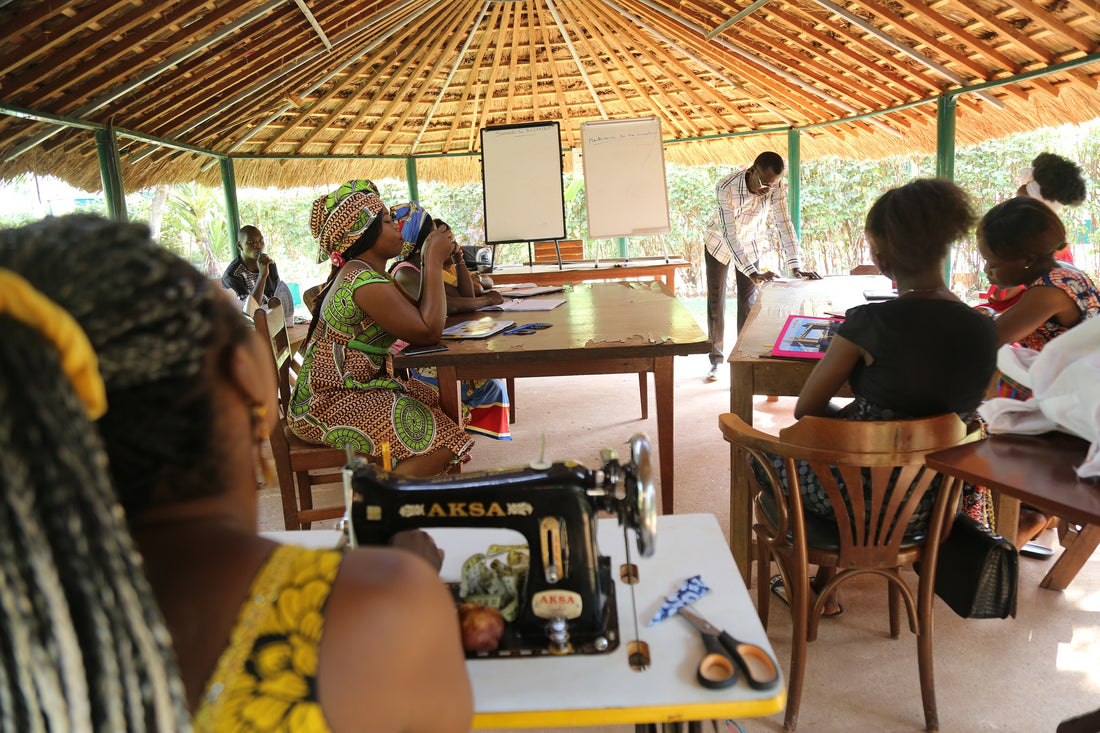
Why do business in the most difficult place?
Share
Ndara’s business structure was intentionally designed to fit the very particular circumstances that come with living and working in the Central African Republic. CAR is a landlocked country in the middle of Africa, with poor accessibility, high prices, and volatile security. It has one of the lowest literacy rates in the world, and is one of the most difficult places in the world to do business according to international rankings.
We are producing products for the developed world in a developing country. Production was designed to be possible without electricity, without prior skills, with minimal tools and literacy. The sales process was designed to be managed by the artisans themselves with minimal formal education or administrative expertise. But, even as we designed the business for the context, we must all constantly learn and evolve to make it successful. Artisan training is crucial to our success.

Ndara’s vision is for the artisans to be able to take on every step of managing this company. Little by little, slowly but surely they will lead the way.
First, Ndara artisans learn how to make the products. Starting with what each artisan already knows, she practices different stitching techniques or learns how to cut patterns. She watches the experienced artisans work, and they explain how they make each product. For some they may pick a new skill up in a few days, for others it can take a couple of weeks. Most new artisans do not know how to use a sewing machine, so once they have learned to sew by hand they are trained to use our pedal-powered sewing machines. During this training time, Ndara pays the artisan a fair daily wage.
Before a new artisan’s products can be sold in our Bangui boutique, her work must pass a quality test. Once she passes this test, she is paid up to nine times the minimum wage for products she makes. She can cover her family’s daily needs and can become financially independent. At this point, we also begin training on more advanced skills.

Skills that take a longer time to learn and may not put food on the table today, but are crucial for the artisan to increase her resilience and independence.
The second training we do is literacy, as most of the artisans struggled to write their names when they joined Ndara. All artisans take one full year of literacy training at the Alliance Francaise, a cultural center in Bangui that provides many types of training. The artisans take a test to determine their level of knowledge, and are then assigned literacy and French classes that they attend three times per week. This training outside of the Ndara workshop allows the artisans to interact and be challenged by other peers.
In addition to classes at the Alliance Francaise, Ndara’s in-house teacher Stella comes to the workshop three afternoons a week to teach numeracy and the metric system to the artisans. Stella is a teacher at a local school, but works extra hours as a tutor for Ndara.
Alongside these classes, Ndara artisans learn while doing. As they become familiar with the alphabet and improve their writing and reading, they also learn to write invoices, to calculate cost and sales prices, and to track inventory. Those who are learning work in the boutique alongside others who are more advanced, honing their still limited knowledge of literacy and numeracy while actively engaging in the business transactions that pay their salaries. The full-circle connection between making a product, selling it, making a salary and putting food on the table solidifies the value of learning for each artisan.
“Ndara means I can take care of my family. It means I can make plans for the future, and my children can go to school. The money I earn from Ndara means that I don't have to depend on anyone to support my family. I bought land, built a house and put it up for rent, it provides me with a passive income - and Ndara made this possible.”- Nadia

Ndara intends to be long-lived, but we expect our work might need to change drastically one day, due to politics or violence.
In its 70 years of independence, the Central African Republic has rarely gone 10 years without civil conflict. We know that calling the Central African Republic home to Ndara means accepting complete unpredictability for the future. We could lose everything tomorrow. We could lose everything and then grow out of those ashes into something new, something stronger.
Regardless of what happens to Ndara as a company, we know that the training we invest in will have long lasting effects on the artisans, their families and their communities.
The most beautiful thing about learning is that nobody can take it away from you. No one can steal your ndara.
